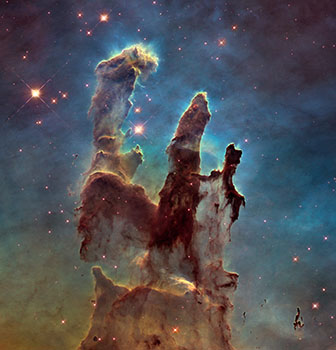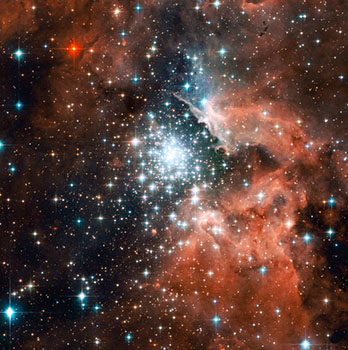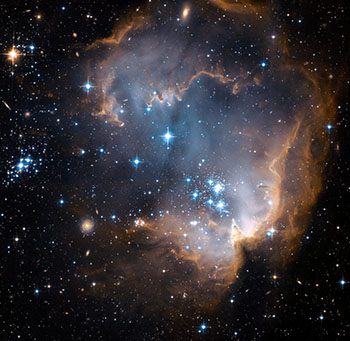From Our Archives
For earlier essays on this week's RCL texts, see Dan Clendenin, Fragments of Faith (2022); Debie Thomas, If You Have Faith (2019) and Doing Faith (2016); Dan Clendenin, Accept One Another (2013) and Though the Fig Tree Does Not Blossom (2010).
This Week's Essay
By Amy Frykholm, who writes the lectionary essay every week for JWJ.
Luke 17:6: “If you had faith the size of a mustard seed, you could say to this mulberry tree, ‘Be uprooted and planted in the sea,’ and it would obey you.’”
For Sunday October 5, 2025
Lectionary Readings (Revised Common Lectionary, Year C)
Psalm 137 or Psalm 37:1–9
2 Timothy 1:1–14
Luke 17:5–10
Pierre Teilhard de Chardin, a 20th century paleontologist, geologist, and Jesuit theologian, once described God as “punctiform.” He wrote, “It is precisely because God is so infinitely profound and punctiform that God is infinitely near.”
Reading Teilhard recently, I had to look up “punctiform.” The sense I had of the word was so counter to my understanding of God that I wasn’t sure how to proceed in following Teilhard’s logic. “Infinitely punctiform” sounds like a paradox. How can something be at once infinite and have the “character of a point”?
These paradoxes were not unfamiliar to Teilhard. Following on recent discoveries in quantum physics and the work of Albert Einstein, Teilhard embraced the idea that all matter is a form of energy. He then took this revelation in a theological direction: all energy is spirit, therefore all matter is spirit. From here, quite naturally, emerged the idea of evolution as a spiritual as well as a material process, and that even human consciousness has evolved and is evolving.
Teilhard’s ideas were roundly rejected by his superiors in the Jesuit order until well after his death, predominantly foundering on the problem of original sin. The Church felt that original sin as an idea (without Adam and Eve) couldn’t survive evolutionary theory. Teilhard died, having written 17 books that were never published during his lifetime.
 |
|
Three-Light-Year-Tall Pillar of Gas and Dust. NASA Hubble Space Telescope.
|
Despite Teilhard’s rejection by church leaders of his day and the fact that few have ever attempted to plumb the depths of his thinking, Teilhard has been making a comeback. The comeback perhaps began in 1995, when Wired magazine published a piece on his concept of the noosphere, a term he helped develop for an evolutionary global human consciousness that looks eerily similar to AI. Our growing conversations about AI mean that Teilhard’s name comes up frequently in debates about its implications and potential. Things that sounded completely crazy in the 1920s are now an ordinary part of the conversation.
In an interview in The Christian Century, Frank and Mary Frost, documentarians with a recent PBS film about Teilhard, say, “Teilhard said that from the very beginning of the Big Bang, all reality had consciousness of cosmogenesis. He thought we as humans had reached a high state of evolution with self-reflective consciousness—the awareness of consciousness—but we were not finished. The next phase would be the noosphere.” Scientist and theologian Ilia Delio summarizes this aspect of Teilhard’s thought and its relationship to AI as, “We are creating the tools and the tools are creating us.”
Jesus’ words in Luke 17 point to something just as outlandish. “If you had faith the size of a mustard seed, you could say to this mulberry tree, ‘Be uprooted and planted in the sea,’ and it would obey you” (17:6). The hyperbole of Jesus’ example prompts us into critical self-reflection. We lack faith. Every single person we know, and every single person through the history of time, lacks faith. If only we had enough faith, we could engage this profound power. Faith, in this understanding, tends to be something like believing hard. What if we could just believe hard enough? Failing to believe any harder, we turn back on ourselves. “O ye of little faith,” we hear echoing through the halls of our fragile belief systems.
 |
|
Extreme Star Cluster Bursts into Life. NASA Hubble Space Telescope.
|
But this self-criticism takes us nowhere near the mystery of what Jesus proposes here. First of all, what about this question of size? Is faith a metric? Are there big faiths and small faiths? Quantified faith? From quantum physics we understand that in the tiniest atom of the universe, the entire power of the universe lies. In the smallest is also the greatest.
We learn that we too emerged from the smallest possible dot, exploding out and expanding into something impossible to imagine from that initial point. This is perhaps, in part, what Teilhard meant when he said that God is “punctiform.” In the dot is the whole. If we carry this idea through Teilhard’s thought, we note that all matter is made up of “points,” and each point contains the whole of God. The mulberry tree, the mustard seed, and the sea are all made up of the very same cosmic stuff—all are matter; all are energy; all are also already spirit.
That leads to the question of what faith might be. What if faith was not believing hard, but rather placing our tiny selves—in the cosmic sense, no more than the tiniest seeds—in alignment with the love of the cosmos? Just as in nature, the seed surrenders to the ground (John 12:24), so we, also of the same stuff as the seed, surrender to this work of creative love. Teilhard defined faith as “living in conscious and rededicated relationship to God.” In his view, faith is a relation—to spirit and to matter, to matter in spirit and spirit in matter. It is primarily and most powerfully, Teilhard wrote, a relation of love. “Love is the most universal of all cosmic energies, a general property of all life.”
 |
|
New Stars Shed Light on the Past. NASA Hubble Space Telescope.
|
In her book For the Time Being, Annie Dillard, reflecting on Teilhard’s life and legacy, writes, “We live in all we seek. The hidden shows up in too-plain sight. It lives captive on the face of the obvious—the people, events, and things of the day—to which we as sophisticated children have long since become oblivious. What a hideout: holiness lies spread and borne over the surface of time and stuff like color.”
Perhaps in Luke 17, Jesus is pointing to our own lack of wonder—for failing to see what is hidden in plain sight. What we seek is already right here, in front of us. When we are aligned with the will of divine love, everything we command will happen because it is already happening. In some mysterious way, we are welcomed to participate in this unfolding work of love. We are, Dillard says, impelled “to divinize, transform, and complete the world.” That’s at least as monumental a task as ordering a mulberry tree to take root in the sea.
Weekly Prayer
Pierre Teilhard de Chardin (1881-1955)
Hymn to Matter (excerpt)
Blessed be you, harsh matter, barren soil, stubborn rock: you who yield only to violence, you who force us to work if we would eat.
Blessed be you, perilous matter, violent sea, untamable passion: you who unless we fetter you will devour us.
Blessed be you, mighty matter, irresistible march of evolution, reality ever newborn; you who, by constantly shattering our mental categories, force us to go ever further and further in our pursuit of the truth.
Blessed be you, universal matter, immeasurable time, boundless ether, triple abyss of stars and atoms and generations: you who by overflowing and dissolving our narrow standards or measurement reveal to us the dimensions of God.
Blessed be you, impenetrable matter: you who, interposed between our minds and the world of essences, cause us to languish with the desire to pierce through the seamless veil of phenomena.
Blessed be you, mortal matter: you who one day will undergo the process of dissolution within us and will thereby take us forcibly into the very heart of that which exists.
Without you, without your onslaughts, without your uprootings of us, we should remain all our lives inert, stagnant, puerile, ignorant both of ourselves and of God. You who batter us and then dress our wounds, you who resist us and yield to us, you who wreck and build, you who shackle and liberate, the sap of our souls, the hand of God, the flesh of Christ: it is you, matter, that I bless.
Translated by Gerald Vann.
Pierre Teilhard de Chardin (1881-1955) was a French paleontologist, geologist, and Jesuit theologian. This hymn is from his Hymn of the Universe (Harper & Row, 1995).
Amy Frykholm: amy@journeywithjesus.net
Image credits: (1–3) RocketSTEM Media Foundation.





